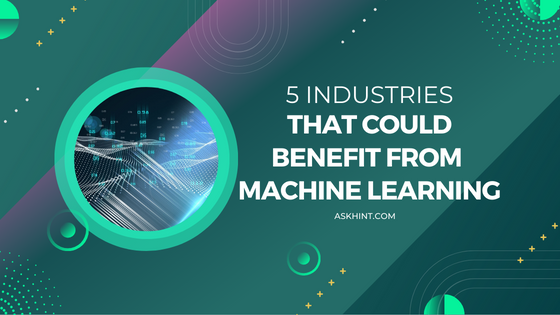Machine learning has been making waves in the news lately and for good reason. The implications of using machines to make decisions have the potential to revolutionize entire industries. As advances in machine learning technology come about, more and more companies are taking notice of its potential and jumping on board. But which industries stand to benefit most from machine learning? In this blog post, we’ll explore five industries that could potentially experience a boost in efficiency and effectiveness thanks to machine learning. From retail to healthcare, there’s something here for everyone!
Healthcare
According to a study by PwC, the healthcare industry is expected to be one of the top beneficiaries of machine learning in the next decade. Machine learning can help healthcare organizations achieve better patient outcomes, lower costs, and improve operational efficiencies.
Some specific applications of machine learning in healthcare include:
– Predictive analytics for population health management
– Real-time fraud detection in claims processing
– Automated diagnosis and treatment recommendations
– Personalized medicine based on individual genetic profiles
– Intelligent medical devices that can proactively detect and diagnose problems
– Virtual nursing assistants for tasks like monitoring vital signs and providing patient education
With so many potential benefits, it’s no wonder that healthcare providers are investing heavily in machine learning initiatives. In fact, PwC’s study found that 43% of healthcare executives believe machine learning will have a “major impact” on their business in the next five years.
Manufacturing
1. Manufacturing
Machine learning can be used in manufacturing to optimize production processes and improve quality control. For example, machine learning can be used to detect defects in products or identify process irregularities. Additionally, machine learning can be used to predict maintenance needs and optimize inventory management. By using machine learning, manufacturers can improve efficiency and reduce costs.
2. Supply Chain
Machine learning can be used in the supply chain to predict customer demand and optimize inventory levels. Additionally, machine learning can be used for forecasting and tracking shipments, which can help improve service levels and reduce costs. Machine learning can also be used to predict market trends, allowing businesses to make informed decisions about their supply chain operations.
3. Automation
Machine learning can be used in automation to improve processes and enable robots to perform tasks more efficiently. For example, machine learning can be used to recognize objects or detect anomalies in data streams, which can help automate processes such as quality checks or employee performance reviews. Additionally, machine learning can be used to develop control systems and trajectory planning algorithms for autonomous vehicles, helping them navigate complex environments safely and accurately.
Agriculture
The agriculture industry has been struggling in recent years due to a number of factors, including droughts, floods, and pests. As a result, farmers are constantly looking for ways to improve yields and reduce costs.
Machine learning could be used to develop better models for predicting weather patterns and forecast crop yields. Farmers could also use machine learning to detect early signs of disease in their crops and take preventive measures. In addition, machine learning could be used to optimize irrigation systems and fertilizer application.
Overall, machine learning could be used to improve the efficiency and effectiveness of agricultural practices. This technology could help farmers increase their yields while reducing their costs and environmental impact.
Retail
The retail industry is one of the most promising sectors for machine learning applications. Retailers have already begun to adopt machine learning in a number of ways, including customer segmentation, product recommendations, supply chain optimization, and fraud detection.
There are endless possibilities for how machine learning can be used to improve the retail experience for both customers and businesses. For instance, machine learning can be used to better understand customer preferences and offer personalized recommendations. It can also be used to streamline the supply chain and detect fraudulent activity.
As the technology continues to evolve, it’s likely that we’ll see even more innovative applications of machine learning in the retail industry. This is an exciting time for retailers who are looking to stay ahead of the curve and provide their customers with the best possible experience.
In the near future, retailers can look forward to AI-powered chatbot assistants, automated checkout processes, and more advanced predictive analytics. These technologies will help retailers stay competitive and deliver the highest level of customer service.
Finance
Finance is an industry that has been using machine learning for some time now. Algorithms are used to trade stocks and predict market trends. Machine learning can also be used to detect fraud and money laundering. Banks are using machine learning to loan money more accurately and to prevent fraud. Insurance companies are using machine learning to better assess risk.
Machine learning is also being used to analyze customer behavior and to help banks better understand their customers. Machine learning can be used by financial institutions to identify patterns in customer purchases or transactions, which can help them determine how to better target customers for different products or services. Additionally, machine learning algorithms are being used to detect unusual activity or fraudulent transactions.
Overall, the use of machine learning in the finance industry is increasing as it provides more accurate and efficient solutions. By leveraging machine learning, financial companies are able to make better decisions that increase profit margins while reducing risk exposure.
Conclusion
Machine learning has the potential to revolutionize many industries. From healthcare, where it can help diagnose diseases more accurately and quickly, to finance and banking, where it can reduce fraud and detect suspicious transactions faster than ever before. The possibilities are endless when it comes to machine learning applications and its potential seems only limited by our imagination. We hope that this article has provided you with a useful overview of how machine learning could benefit five different industries – now all you need to do is start getting creative about how your own business might be able to take advantage of this cutting-edge technology!



